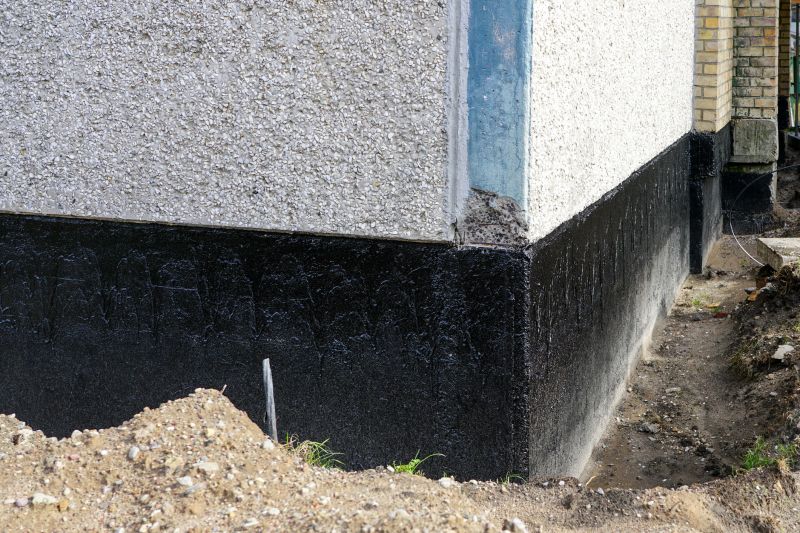Top Waterproofing Products to Protect Your Property Effectively
Discover the leading waterproofing solutions designed to ensure durability and prevent water damage in various structures.
 Waterproofing products are essential solutions for protecting structures, foundations, and surfaces from moisture intrusion and water damage. They come in various forms to suit different applications, whether for residential, commercial, or industrial projects. Proper selection of waterproofing materials can help prevent issues such as mold growth, structural weakening, and interior damage caused by water infiltration. From basement sealing to roof coatings, the right product can enhance durability and longevity of a building. It is important to understand the specific needs of each project to choose the most appropriate waterproofing solution.
Waterproofing products are essential solutions for protecting structures, foundations, and surfaces from moisture intrusion and water damage. They come in various forms to suit different applications, whether for residential, commercial, or industrial projects. Proper selection of waterproofing materials can help prevent issues such as mold growth, structural weakening, and interior damage caused by water infiltration. From basement sealing to roof coatings, the right product can enhance durability and longevity of a building. It is important to understand the specific needs of each project to choose the most appropriate waterproofing solution.
Top Overall Option
Comprehensive Waterproofing System
A versatile and durable waterproofing solution designed for multiple surfaces and conditions. It combines a high-performance membrane with easy application methods, making it suitable for both DIY projects and professional installations. Its adaptability ensures effective moisture barrier protection, helping to maintain structural integrity over time.
Types of Products For Waterproofings
Liquid Waterproof Coatings
Flexible and seamless coatings that form a waterproof layer over surfaces such as roofs, decks, and basements.
Waterproof Membranes
Sheet or rolled membranes that provide a reliable barrier against water ingress in foundation or roof applications.
Sealants and Caulks
Flexible sealants used to fill gaps, joints, and cracks to prevent water penetration.
Cementitious Waterproofing
Waterproof coatings made from cement-based materials suitable for underground or below-grade surfaces.
Bituminous Coatings
Tar-based or asphalt-based products ideal for roofing and below-grade waterproofing.
Polyurethane Coatings
Durable coatings that offer elasticity and strong adhesion for various surfaces.
Acrylic Waterproofing
Water-based coatings that provide UV resistance and are easy to apply on roofs and walls.
Rubberized Coatings
Flexible coatings suitable for sealing and waterproofing irregular surfaces.
Hydrophobic Sealers
Penetrating sealers that repel water and protect porous surfaces.
Crystalline Waterproofing
Chemical treatments that create internal waterproof barriers within concrete structures.
Fluid-Applied Membranes
Spray or brush-applied membranes that conform to complex shapes and surfaces.
Polymer Modified Bitumen
Enhanced asphalt products used for roofing and foundation waterproofing.
Waterproofing Paints
Paints formulated with waterproofing agents for walls and ceilings.
Epoxy Waterproof Coatings
High-strength coatings suitable for industrial applications and concrete surfaces.
Spray-On Waterproofing
Quick-application solutions that form a waterproof barrier on various surfaces.
Popular Choices
Widely used for their ease of application and seamless coverage.
Commonly selected for foundation and roofing projects due to their reliability.
Popular for sealing joints, cracks, and gaps in various structures.
Favored for underground and below-grade applications for its compatibility with concrete.
Chosen for their proven performance in roofing and waterproofing basements.
Valued for their elasticity and adhesion on diverse surfaces.
Popular for roofs and exterior walls due to UV resistance.
Selected for sealing irregular or moving surfaces requiring flexibility.
Effective for protecting porous surfaces like stone and brick.
Used in structural concrete to enhance internal water resistance.
Preferred for complex geometries and detailed surfaces.
Commonly used in roofing and foundation waterproofing for durability.
Applied on walls and ceilings to add an extra layer of moisture resistance.
Selected for industrial floors and concrete structures.
Valued for quick coverage and conformability to surfaces.
Key Buying Considerations
- Identify the specific area or surface that requires waterproofing to select the most suitable product type.
- Consider the exposure conditions, such as constant moisture, UV exposure, or chemical contact.
- Check compatibility of the waterproofing material with existing surfaces and substrates.
- Evaluate the ease of application, including tools required and drying or curing times.
- Determine whether a seamless or sheet-based solution is preferable for your project.
- Assess the flexibility and elasticity of the product, especially for surfaces prone to movement or cracking.
- Review the longevity and durability expectations based on product specifications.
- Ensure proper surface preparation before application to maximize effectiveness.
- Consider the environmental conditions during application, such as temperature and humidity.
- Look for products with clear instructions and technical datasheets for proper installation.
- Balance cost with quality to ensure a reliable and long-lasting waterproofing solution.
- Check if the product is suitable for interior, exterior, or underground use.
- Determine if maintenance or reapplication is needed over time for your chosen product.
- Review any safety precautions or ventilation requirements during application.
- Consult with professionals if unsure about the best product for your specific project needs.
